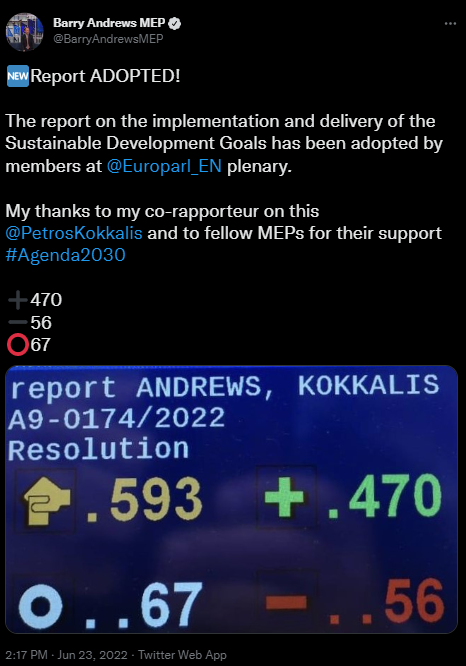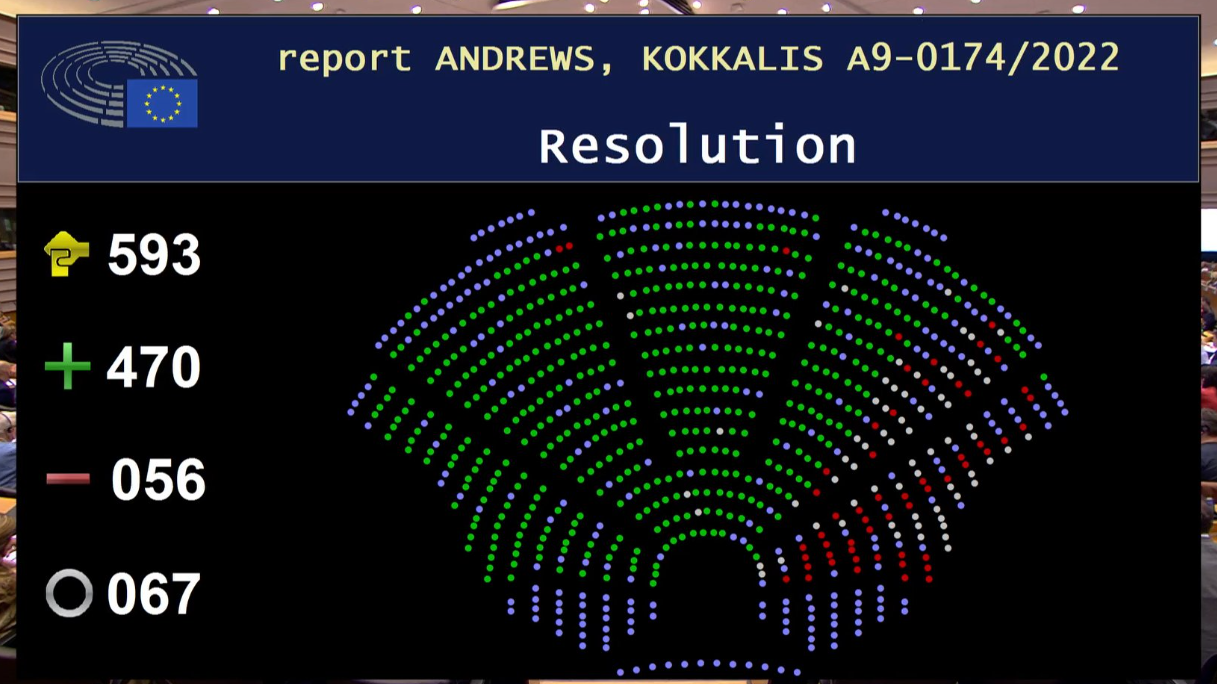In June 2022, the European Parliament in plenary voted to adopt a Motion for a European Parliament Resolution on on the implementation and delivery of the Sustainable Development Goals (SDGs) the EU’s first report on the SDGs.
View the adopted resolution here.
EXPLANATORY STATEMENT from the European Parliament
With just 8 years left to meet the targets outlined under the 2030 Agenda for Sustainable Development, it is pertinent that the EU immediately steps up its global efforts to meet all 17 Sustainable Development Goals (SDGs). In September 2015, UN Member States adopted the 2030 Agenda for Sustainable Development, noting that the 17 goals and 169 targets are integrated and indivisible, and that they balance the economic, social and environmental dimensions of sustainable development, providing a holistic vision for the wellbeing of people and the planet, placing equality and resilience at the core. They provide the only universally agreed and universally applicable framework for global evidence-based policy-making in this crucial decade. The interlinkages and integrated nature of the SDGs are of crucial importance to the realisation of Agenda 2030. In light of the COVID-19 pandemic, they provide a unique pathway to recovery and to ‘building back better’, that is, constructing a more equitable and resilient world that prospers within planetary boundaries, while leaving no one behind.
To that end, this report focuses on the tools currently at the EU’s disposal to help globally implement the SDGs. Rather than honing in on specific SDG targets and progress made to date, this report identifies the remaining gaps and challenges and addresses various opportunities which would assist the EU in its global efforts to meet all 17 SDGs by 2030. The report should also be seen as an EU effort to sum up its progress before attending the annual High Level Political Forum (HLPF) in July 2022. The HLPF is the main United Nations platform on sustainable development and it has a central role in the follow-up and global review of the 2030 Agenda for Sustainable Development and the SDGs. This year’s HLPF will focus on how to build back better from the coronavirus disease (COVID-19) while advancing the full implementation of Agenda 2030.
Long-term planning for obtaining the SDGs is no longer sufficient, urgent action is now necessary. This report seeks to demonstrate how, despite a significant effort to map the EU’s progress on the SDGs, the EU has thus far failed to fulfil its role as leader in the global effort to achieve the 17 SDGs. Better implementation is therefore needed, which will require more coherent financing and, above all, stronger leadership both within the EU and on the global stage.
As is demonstrated by the landmark European Green Deal, sustainable development is at the core of the EU’s identity. The EU was a leader in the revision of the Millennium Development Goals (MDGs) and the negotiation of Agenda 2030. Article 3 of the Treaty on European Union commits the EU to the sustainable development of Europe, whereas Article 21 explicitly states that the EU shall promote sustainable development beyond its borders, including in developing countries. The EU is obliged to incorporate the objectives of development cooperation into any internal or external policies that are likely to affect developing countries, as set out in Article 208 of the Treaty of the Functioning of the European Union. Policy coherence for development (PCD) constitutes a key pillar of the EU’s efforts to increase the effectiveness of development cooperation. This concept of policy coherence in support of development objectives was introduced in EU fundamental law in 1992 with the Treaty of Maastricht and was further reinforced in the Treaty of Lisbon in 2009 and, subsequently, in the 2017 ‘European Consensus on Sustainable Development’. In 2019, European Commission President von der Leyen committed to a ‘whole of government’ approach to the SDGs. As a result, efforts have been made to mainstream the SDGs across each Commissioner’s portfolio, to ensure that trade agreements promote sustainable development, to embed binding SDG targets within the NDICI-Global Europe instrument and to integrate the SDGs into the European Semester.
This report seeks to highlight, nonetheless, that EU’s strategy on SDG implementation contains serious deficiencies, namely in terms of governance, which has had a detrimental impact on EU efforts to garner political interest, secure progress and gain societal legitimacy. As such, a core demand of report is that the EU adopts a single, high-level strategy for the EU’s implementation of the SDGs until 2030. This should reform the governance of the SDGs, tackling issues such as leadership, targets, monitoring and financing.
The EU’s inability to adopt such as a strategy has resulted in significant ecological, social and economic spillovers on a global scale. Although high-income countries – including all EU Member States – have made most progress on the SDGs, they also generate the greatest spillovers worldwide, which may undermine the ability of developing and least developed countries to achieve their targets. Further understanding is therefore needed of the transboundary nature of sustainable development. To this end, the work of Eurostat to quantify spillover effects in the 2021 edition of its SDG monitoring report must be continued. It is fundamental that the methodology used is further developed in order to sufficiently identify the EU’s true global footprint and to take corrective measures.
Climate change is an example of a transboundary phenomenon that is now affecting every country on every continent. It is disrupting national economies and affecting lives, costing communities and states dearly today and even more tomorrow. This report aims to acknowledge the close interlinkages between climate change and sustainable development. Indeed, climate change can undermine progress towards sustainable development. Conversely, science- and evidence-based climate change mitigation and adaptation measures can have a positive and long-lasting contribution to poverty alleviation, food security, healthy ecosystems, equality and justice. Some SDGs have a strong environmental dimension such as SDG 13 on climate action (which aims to “take urgent action to combat climate change and its impact”), SDG 14 on conservation of marine ecosystems, and SDG 15 on the conservation of terrestrial ecosystems and the sustainable use of their resources. Nevertheless, all Goals are deemed to have a strong connection – direct or indirect – to climate action.
The European Green Deal aims to transform the EU into a fair, inclusive and prosperous society, with a resource-efficient, circular economy, with no net emissions of greenhouse gases in 2050. In the light of the recent pandemic and its severe effects on health and the wellbeing of citizens, the value of the European Green Deal has become even more evident. In committing to climate-neutrality, and while designing and adopting the transformative and crosscutting measures required to achieve it, the EU has pledged to place people first and make the transition just and inclusive. In this regard, the climate and environmental objectives defined in the European Green Deal are part of the Union’s strategy to deliver the SDGs, and vice versa. The link between the European Green Deal and the SDGs was recently recognised in the 8th Environment Action Programme (EAP), which “forms the basis for achieving the environment and climate-related objectives defined under the UN 2030 Agenda and its SDGs’. Ahead of the 27th United Nations Climate Change conference (COP27), the European SDG Summit on 10-12 October 2022 will convene sustainability leaders worldwide to address one pressing question: how can we build together a green and inclusive Europe? As such, more effective implementation of the SDGs is an essential prerequisite of the attainment of the EU’s climate objectives.
The issue of accountability must also be addressed. Voluntary National Reviews are the pivotal accountability mechanism of Agenda 2030. However, a significant degree of policymaking now takes place at EU-level, which warrants the presentation of an EU specific Voluntary Review (EUVR). This will ensure that EU institutions fulfil their commitments of implementing a clear strategy and meet the required targets. More effort should also be invested in local and regional monitoring. Democratic scrutiny and civic participation in the EU’s SDG implementation must be further reinforced.
Finally, there can be no implementation without adequate financing. The OECD’s Global Outlook on Financing for Sustainable Development 2021estimates that COVID-19 has caused an overall decline in resources of USD 700 billion, and an increase in needs of USD 1 trillion (the so-called scissor effect) so that the SDG annual funding gap in developing countries of USD 2.5 trillion before the pandemic could increase by 70% post-COVID-19 to USD 4.2 trillion (EUR 3.7 trillion).
Yet there is no single plan to finance the SDGs – neither at global nor at EU level. The report aims, therefore, to highlight the importance of the EU budget, which plays an important role in the implementation of SDGs. However, it also recognises that the public money will not be enough. Resource mobilisation, including from private stakeholders, and the revision of the European Architecture for Development will be key, as will a better, more structured framework to track SDG expenditure.
The greatest challenges of our time – climate change, pandemics, conflict, mass displacement, extreme poverty – are all highly complex and require holistic, global responses: Agenda 2030 is the only framework that enables such a response. It is time that the SDGs are taken seriously. To live up to its name and tackle the issues that affect the lives of European citizens and our partners around the world, it is a matter of political urgency that the EU dramatically scales up its efforts towards Agenda 2030, internally and on the global stage.
Barry Andrews, Irish MEP said,
“Thanks to the work of my colleagues in the SDG Alliance, I am proud that this is the first time the European Parliament is expressing its position on the SDGs this term. The EU is failing on its duty to fully implement the SDGs – no EU Member State is on track to achieve the goals, and over the past two years progress has entirely stalled and even regressed in some areas. In the same way that we did not allow our green ambitions to fall by the wayside in light of the Covid-19 pandemic or Russia’s war of aggression on Ukraine, we must do the same for the SDGs. Indeed, at a time when the values upon which our society is built are being undermined and attacked, now is the time to invest in the SDGs. We need to defend the SDGs not in spite of Putin’s invasion of Ukraine, but precisely because Putin invaded Ukraine. What is ultimately needed is stronger and more effective governance of the SDGs within the European Commission. We strongly hope this report will be continued from 2023 onwards as an Annual Strategic Report. With less than 8 years left to achieve the goals, the stakes are simply too high.”
Catherine Chabaud (France, Renaissance), Renew Europe shadow rapporteur in the Committee on the Environment, Public Health and Food Safety (ENVI), added:
“Today I welcome the adoption of the report on the implementation of the Sustainable Development Goals in the plenary session, and I would like to applaud the excellent work of my colleague Barry Andrews. I am convinced that SDGs should be the backbone of European public policies. It is through this integrated approach that we will respond to the major development challenges facing Europe and the world today



